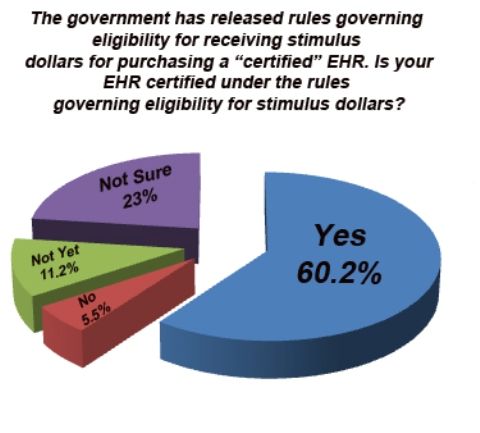2011 Tech Survey: For Practices with EHRs, Certification is a Challenge
Getting an EHR to achieve certification is not always an easy feat for practices that had EHRs pre-meaningful-use, judging by the results of our 2011 Physicians Practice Technology Survey.
Note: This is the first in a series of blog entries delving into the results of our 2011 Physicians Practice Technology Survey. Full results of our latest technology survey are now available at www.physicianspractice.com/technology-survey.
For the last 12 months, one of the biggest tech challenges for practices has been achieving meaningful use through of a certified EHR. Note the word “certified.” Getting an EHR to achieve certification is not always an easy feat for practices that had EHRs pre-meaningful use, judging by the results of our 2011 Physicians Practice Technology Survey.

Of the 642 physician practices - both hospital-owned and independent - who answered a question about whether their existing EHR Is certified under CMS’ rules governing eligibility for stimulus, just 60 percent answered a definitive “yes,” while 11 percent said “not yet” and 23 percent said “not sure.”
It should be noted that independent practices were more certain of their EHR’s certification status (only 15 percent of independent practices answered “not sure” versus 38 percent of practices that are part of a hospital or integrated delivery network).
Often the vendor is to blame for those practices whose EHR certification status is in limbo. A handful of smaller EHR vendors were bought out by bigger corporations, so patches and upgrades weren’t available for those legacy systems. In other cases, the vendor is slow to roll out updates.
Then there’s the issue of finances - the money a practice must fork over to upgrade its EHR to make it eligible for federal stimulus dollars. According to our survey, 13 percent of practices paid more than $10,000 on their EHRs or other technology to do this.
Either way, if your practice purchased an EHR more than a year ago, don’t wait until the end of 2011 to see if your system is up to snuff (meaningful-use ready). Doing that could cause your practice to miss key deadlines and lose out on some of the incentive dollars.
Recently, healthcare consultant Susanne Madden, president of The Verden Group, told us the most important thing you can do if you have a pre-meaningful use EHR is to assess whether your system is appropriate for your practice's long-term goals.
“Practices need to talk to their EHR vendors," said Madden. "What are they doing? When are they doing it? How's this going to roll out? What are the costs going to look like? And really be able to make a good, solid assessment on what the costs are going to be for the practice. Then compare it to some of the options out there in the marketplace."
So let’s hear from you. Is your EHR certified? If not, what’s the holdup?